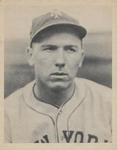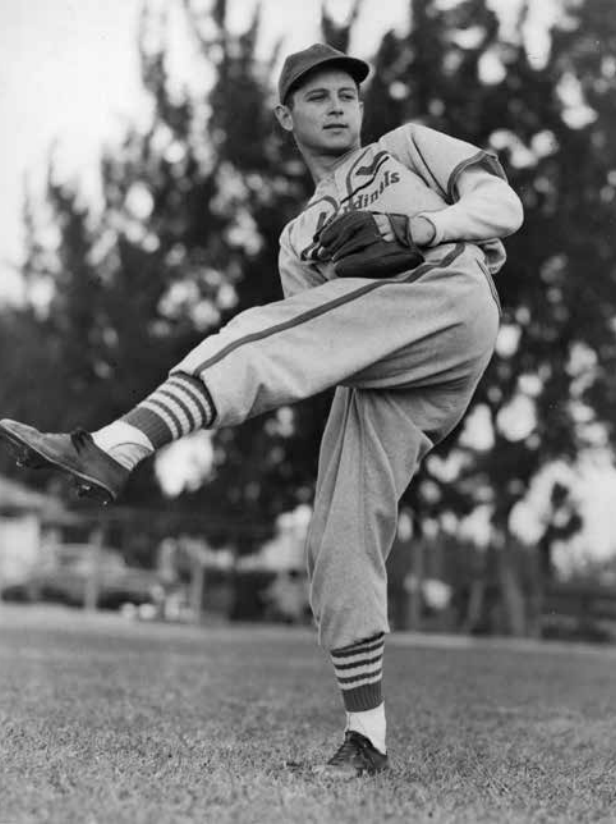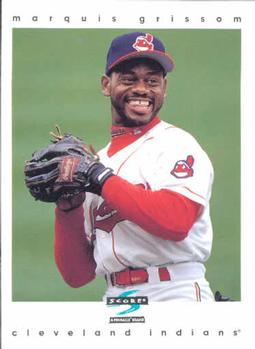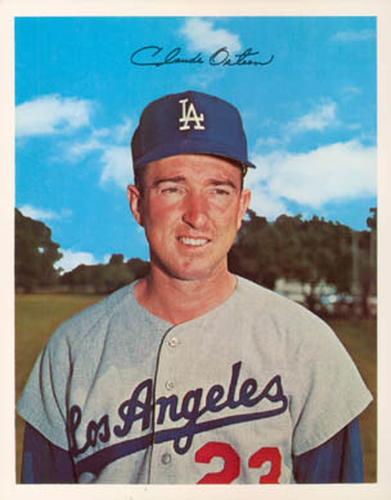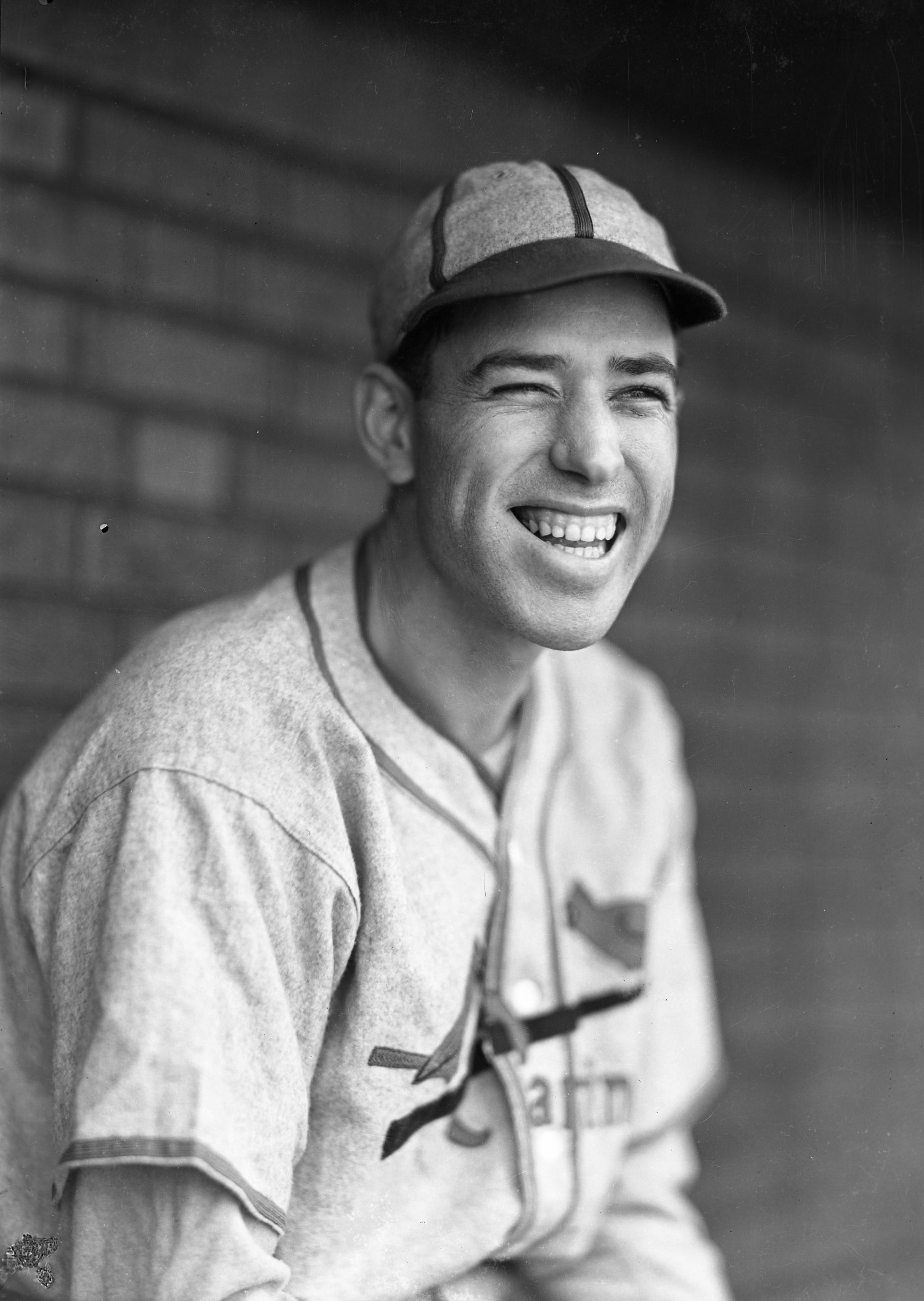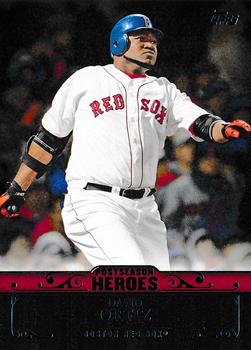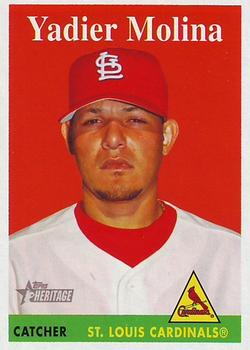October 19, 1999: Braves win NL pennant as Mets’ Rogers walks in winning run
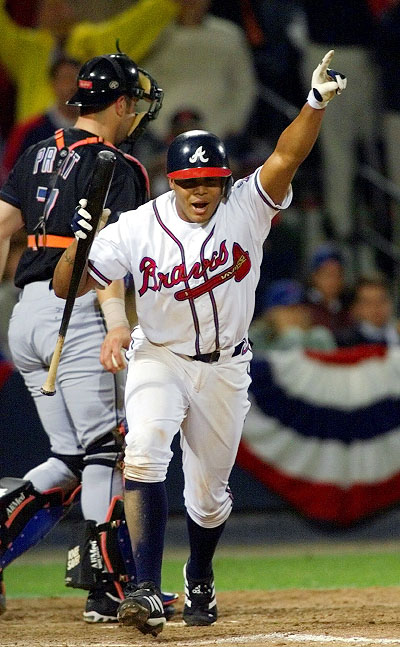 The Atlanta Braves returned to Turner Field still needing a win to clinch the National League pennant on October 20, 1999. After taking a 3-0 lead in the NL Championship Series, they had lost the last two games in New York. The momentum had changed and the Mets were now thinking that they might make a comeback in the series as the two teams prepared for Game Six.
The Atlanta Braves returned to Turner Field still needing a win to clinch the National League pennant on October 20, 1999. After taking a 3-0 lead in the NL Championship Series, they had lost the last two games in New York. The momentum had changed and the Mets were now thinking that they might make a comeback in the series as the two teams prepared for Game Six.
Both teams were facing different legacies this evening. The Braves didn’t expect to face much competition in their quest for another World Series championship after winning five of six games against the Mets near the end of the regular season. But suddenly they were on the verge of a historic collapse in the NLCS.1 At the time, no teams had ever won the first three games and lost a playoff or championship series.2
The Mets had seen their postseason chances almost evaporate at the end of the regular season. They had lost eight of nine games to the Braves and Philadelphia Phillies. Their dream of clinching the division was gone in just over a week.
But the Mets put themselves back together. Their young players snapped out of a daze and the veterans finally stepped up to keep their playoff hopes alive.3 They won their last final three games, a sweep of the Pirates. Then they won a wild-card playoff tiebreaker against the Cincinnati Reds and beat the NL West champion Arizona Diamondbacks in four games. After their epic 15-inning victory at Shea Stadium in Game Five of the NLCS, the Mets looked like they might be a team of destiny.
The Braves sent Kevin Millwood to the mound, hoping he would help them to regain their confidence. Millwood had pitched seven solid innings on his way to winning Game Two. He told the press that he was confident. Reflecting on his previous win before the game, he said, “I didn’t have my best stuff [in Game Two]. … They probably saw a lot of pitches last time they won’t see this time.”4
Mets manager Bobby Valentine sent Al Leiter to the mound. Leiter had pitched well in a losing effort in Game Three. He gave up only one unearned run in that game and somehow wound up with the loss as the Mets failed to score. While he had a 3.67 ERA in his last four starts, he was pitching on three days’ rest for the first time since 1994. Valentine thought he could count on Leiter since he had only thrown 103 pitches in his previous game.5
The Braves stormed out to a 5-0 lead in the first inning. Leiter hit leadoff batter Gerald Williams and then walked Bret Boone. Williams and Boone then took advantage of catcher Mike Piazza. Piazza was playing hurt; he had suffered a mild concussion in Game Three.6 When he tried to throw out Williams as the runner went for third, Piazza’s throw skipped past the third baseman to allow Williams to score. Leiter ended up hitting another batter and giving up two singles before Valentine finally removed him from the game. He had not even recorded an out.
Millwood kept the Mets in check for the first five innings. He gave up just four singles. Two of the singles came in the fifth inning and these might have been harbingers of things to come.
The Mets hitters finally came alive in the sixth. Millwood gave up a double to Edgardo Alfonzo and a single to John Olerud to start the inning. Piazza hit a sacrifice fly to score Alfonso. Millwood then gave up a double to Robin Ventura and a single to Darryl Hamilton. Hamilton’s single scored two runners and suddenly the score was 5-3. Bobby Cox replaced Millwood with Terry Mulholland who retired the side when he got Rey Ordonez to ground out into a double play. But the Mets had scored three runs to narrow the Braves’ lead.
Pat Mahomes, who replaced Leiter in the first inning, pitched well through the fourth. Turk Wendell took over in the fifth and got the Braves out in order. But he fell apart in the sixth inning when he couldn’t get the Braves out. He loaded the bases before Valentine pulled him for Dennis Cook. Cook gave up a single to pinch hitter Jose Fernandez that scored two runs. By the time Cook got Williams to fly out and end the inning, the Braves were up 7-3.
But the Mets were not done scoring. They exploded for four more runs in the top of the seventh to tie the game. Cox had called on John Smoltz to come from the bullpen. Smoltz, pitching on three days’ rest after starting Game Four, was shelled from the first pitch.
Smoltz gave up consecutive doubles to Henderson and pinch hitter Matt Franco to lead off the inning. After Smoltz got Alfonzo to fly out to right field, Olerud hit a single and two runs scored. Now Piazza stepped to the plate and blasted a home run; suddenly the score was tied 7-7. Mike Remlinger came in from the bullpen to stop the bleeding but the damage was already done.
In the bottom of the eighth, the Mets took the lead for the first time. Leadoff batter Benny Agbayani singled and moved to second on a sacrifice bunt by Ordonez. He scored when pinch-hitter Melvin Mora singled to center field.
Valentine made some defensive moves in the bottom of the eighth. He also brought in John Franco from the bullpen. After Franco got the first out, Eddie Perez singled. Cox replaced Perez with the speedy Otis Nixon as pinch runner. When Nixon tried to steal second, Piazza’s throw was short and bounced into left field. Piazza’s error allowed Nixon to reach third. He scored when Brian Hunter singled on the next pitch. The game was tied once again.
Cox brought in his closer John Rocker to face the Mets in the ninth. Rocker got the Mets out in order. Valentine likewise brought in his closer, Armando Benitez, who also managed to get the Braves out without allowing any runs. Both teams would now play extra innings for the second consecutive game.
The Mets again took the lead, 9-8, in the top of the tenth inning. Rocker walked Agbayani to start the inning. Mora’s single got Agbayani to third base. He scored when Todd Pratt hit a sacrifice fly to center field. The Mets were now just three outs away from winning.
Valentine stayed with Benitez in the bottom half of the tenth. Benitez gave up a leadoff single to Andruw Jones. After getting Greg Myers to fly out to left field, Benitez walked pinch hitter Ryan Klesko. Cox then sent in Ozzie Guillen to pinch hit. Guillen hit a single to right field that scored Jones to tie the game.
The game might have ended in the 10th if rookie right fielder Mora hadn’t thrown out Klesko as he tried to make it to third on Guillen’s hit. After Benitez got Jorge Fabregas, the Braves’ last bench player, to hit a fly ball to left field for the third out, the game entered the 11th inning.
Cox called in Russ Springer from the bullpen. Springer managed to get the Mets out in order as Olerud flied out to center field, pinch hitter Shawon Dunston fouled out to the first baseman and Ventura ground out to second base.
Valentine now called on Kenny Rogers to pitch his second relief appearance of the series. Rogers had pitched two scoreless innings in Game Five. Rogers quickly got two strikes on Williams. Williams sent the third pitch down the third base line for a double. A sacrifice bunt by Boone sent Williams to third.
Valentine then told Rogers to intentionally walk Chipper Jones to set up a double play. After failing to get the next batter, Brian Jordan, to swing at the first two pitches, Valentine ordered Rogers to intentionally walk him as well. Now there was a potential force out at any base.
Rogers now faced Andruw Jones. His first two pitches were balls. Jones hit the next pitch foul. Rogers’ fourth pitch was outside for the third ball. The next pitch was a called strike and the count was now 3-2.
Joe Morgan told Bob Costas on the national broadcast: “Bob, you’d hate for it to end on a walk. This game has been such a good ballgame that you want it to end with another hero, and not a goat.”7 But there would be no hero this evening. Rogers’ next pitch was high and outside and Williams ran home with the winning run.8
“I just think we ran out of gas,” Hamilton said afterward. “Kenny Rogers gave everything he had. Benitez gave everything he had. He didn’t have much left. But he gave it all. It’s just tough at this point to say that it’s over.”9 In the Braves clubhouse, Jordan told the press: “I’m so stressed out. It was very emotional. We thought we had it; we didn’t. They thought they had it; they didn’t. I’m exhausted, beat up, tired.”10
The Braves were going to the World Series and the Mets were going home. The game was a fitting end to a thrilling series. “I’m going to take some time during the winter to watch these games and try to enjoy them like millions of people got to enjoy them,” Valentine said. “They were fabulous games. …We gave everything we had.”11
This article was published in “Met-rospectives: A Collection of the Greatest Games in New York Mets History“ (SABR, 2018), edited by Brian Wright and Bill Nowlin. To read more articles from this book at the SABR Games Project, click here.
Sources
In addition to the sources cited in the Notes, the author also used the Baseball-Reference.com, Baseball-Almanac.com, and Retrosheet.org websites for box score, player, team, and season pages, pitching and batting game logs, and other pertinent material.
http://www.baseball-reference.com/boxes/ATL/ATL199910190.shtml
http://www.retrosheet.org/boxesetc/1999/B10190ATL1999.htm
Notes
1 Dave Sheinin, “Braves Walk Past Mets to Reach World Series, 10-9,” Washington Post, October 20, 1999.
2 Grant Brisbee, “A history of baseball teams down 0-3 in a postseason series,” SB Nation.com, October 17, 2016
3 William Rhoden, “Now the Mets Have Whole New Attitude,” New York Times, October 20, 1999.
4 Matthew Callan, “1999 Project: NLCS Game 6,” Scratchbomb.com, November 10, 1999.
5 Ibid.
6 Ibid.
7 Ibid.
8 Ibid.
9 William Rhoden, “Now the Mets Have Whole New Attitude,” New York Times, October 20, 1999.
10 Dave Sheinin, “Braves Walk Past Mets to Reach World Series, 10-9,” Washington Post, October 20, 1999.
11 Ibid.
Additional Stats
Atlanta Braves 10
New York Mets 9
11 innings
Game 6, NLCS
Turner Field
Atlanta, GA
Box Score + PBP:
Corrections? Additions?
If you can help us improve this game story, contact us.


